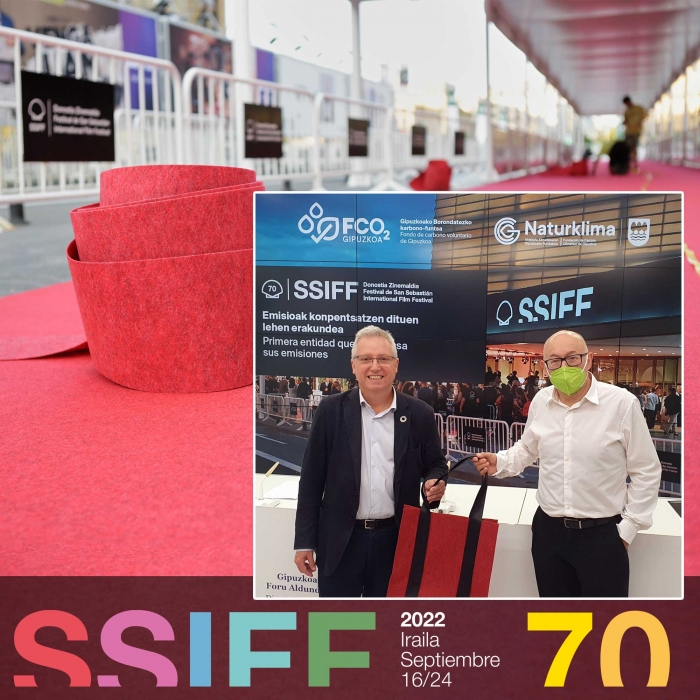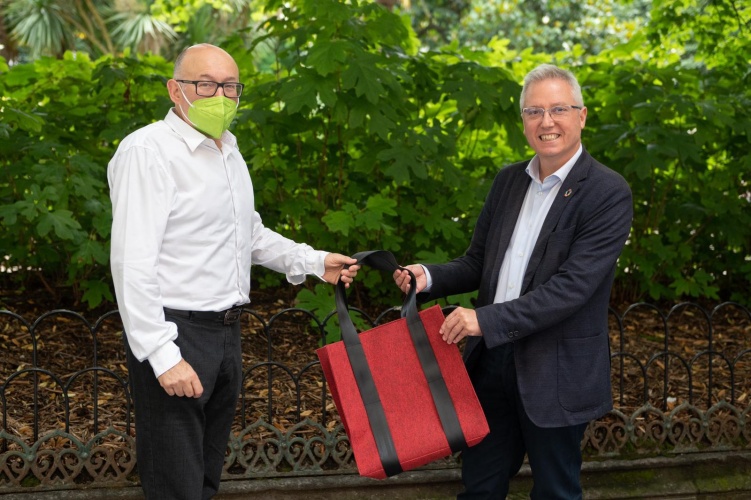For the second year running, the Festival will use recycled and recyclable material to make the red carpets
This morning, the Provincial Council Deputy for the Environment and Hydraulic Works, José Ignacio Asensio, and the Director of the San Sebastian Festival, José Luis Rebordinos, announced that the event will be the first institution in Gipuzkoa to offset its carbon footprint by means of the Gipuzkoa Voluntary Carbon Fund. Asensio congratulated the Festival for its “firm and decisive commitment to defending sustainability at an event of global impact”, and expressed his gratitude for “the fantastic efforts made by the organisation to position itself as a carbon-neutral international festival which calculates, reduces and offsets its carbon footprint”. “This landmark –he added– once again places Gipuzkoa at the forefront of the climate pledge”.
Once the analysis of its carbon footprint had been completed, the Festival’s total emissions estimate, based on the last edition to have taken place before the pandemic (2019), stood at 5395 t CO2 eq. This amount includes the emissions produced both during the months of preparation and during the event itself. According to the report, the percentage of these emissions corresponding to transport stood at 75% (4046.25 t CO2 eq). José Luis Rebordinos explained that at an event like the Zinemaldia, international flights are virtually impossible to avoid and are difficult to mitigate when it comes to their carbon footprint, meaning that offsetting becomes essential in this area.

“Our aim during the year is to further the transition towards a more sustainable festival started in 2021”, assured Rebordinos. The event will therefore continue its work to boost aspects such as increased waste collection, the use of LEDs and procuring more sustainable contracts. Other actions now joining these include those promoted by the Provincial Council, given that “San Sebastian Festival will never become a neutral emission event or institution if it doesn’t combine offsetting with changes in the way it works”.
In this first year, the Festival will offset more than half of its emissions, achieving some 53%. This offsetting will increase to 70.21% when referring to total transport emissions. In financial terms, offsetting 2840.81 t CO2 eq will have a total cost of €25,000, all of which will go to the Gipuzkoa Voluntary Carbon Fund for its investment in projects to improve local green infrastructures helping to regenerate the functionality of Gipuzkoa’s natural carbon sinks, mainly forests and oceans.

Recycled red carpet
As well as offsetting its carbon footprint, the Festival and the Department of Environment strengthen their pledge to use recycled and recyclable fabric for the red carpets rolled out at both the Kursaal and the Victoria Eugenia Theatre.
Deputy José Ignacio Asensio emphasized that this initiative favouring a sustainable red carpet “represents a significant landmark, since, as well as its significant and recognisable symbolic importance as one of the Festival’s identifying features, it is an obvious example of applying the fundamental principles of the circular economy due to keeping the complete value chain within the territory, from the moment of creating and producing the carpet until its subsequent recycling”.
In this line, after the Festival’s upcoming 70th edition, the red carpet witnessing the parade of famous movie stars including Juliette Binoche will be recycled by the company Sin Desperdicio, a member of the Emaús Social Foundation Group, which will make 100% recycled bags, and whose handles will once again be produced by the company Spanset using truck tie-down straps. Said bags will go to the Gipuzkoa Food Bank, where they will be used to hold the products going to those who need them when the time comes.
The red carpet is 100% recycled and recyclable. It is made solely from polyester, avoiding combinations with any other material requiring removal prior to recycling, and can therefore complete its useful life on being turned once again into polyester fibre for a new cycle of sustainable use in a categorical example of the circular model.











